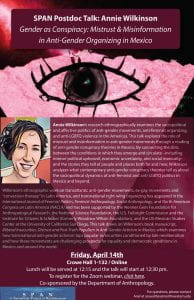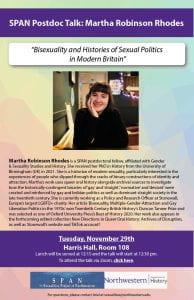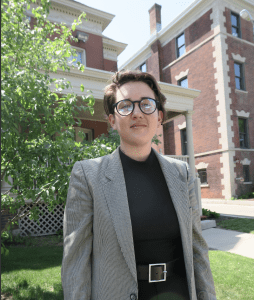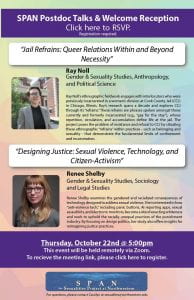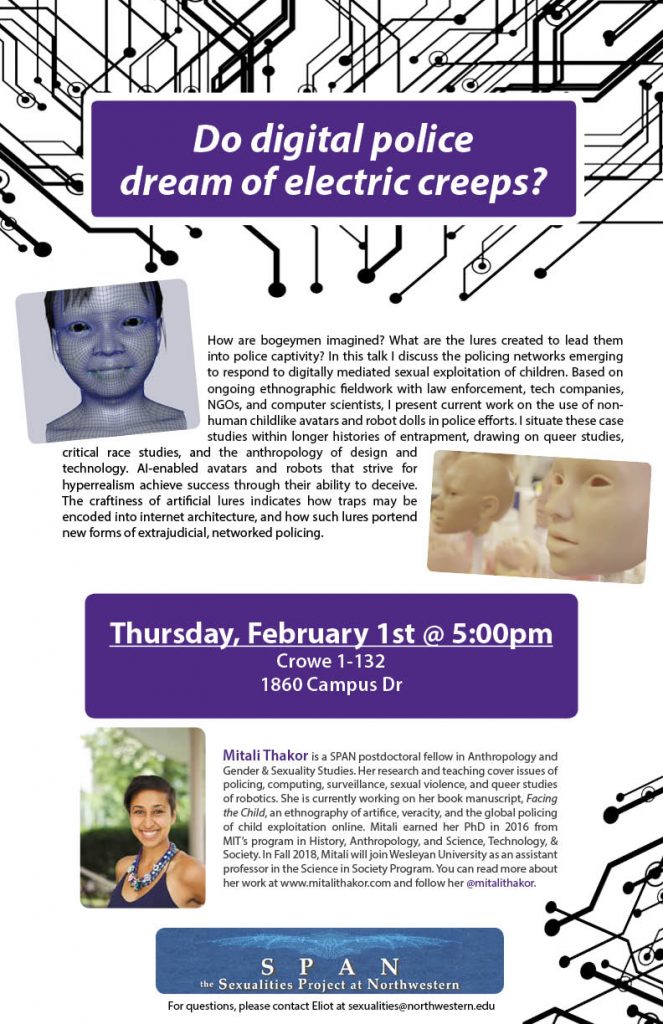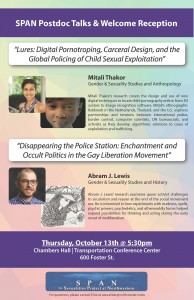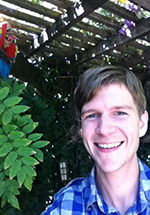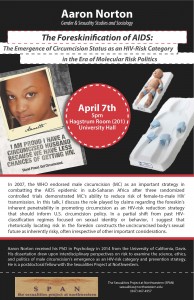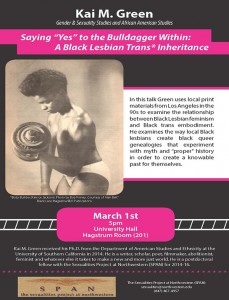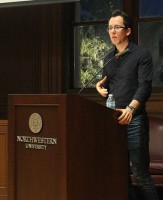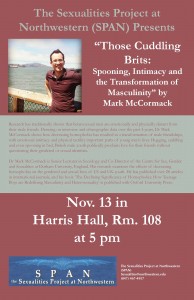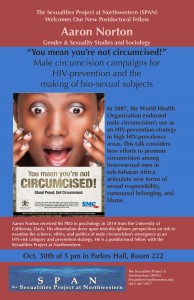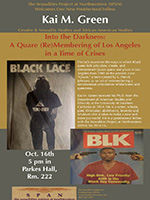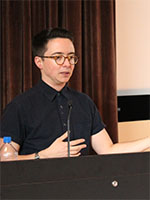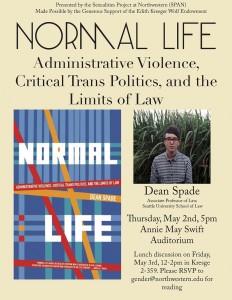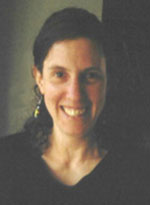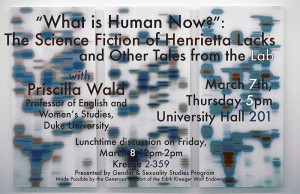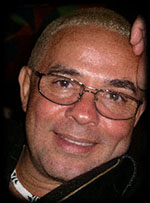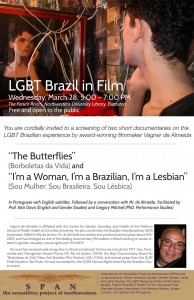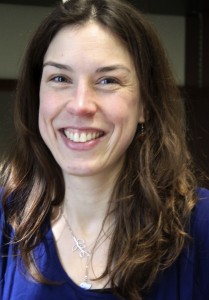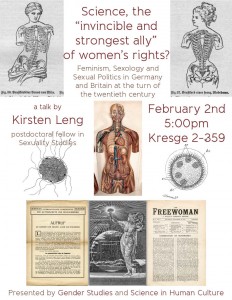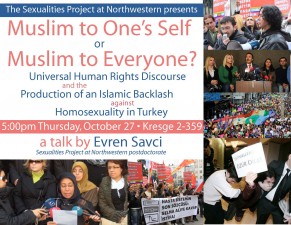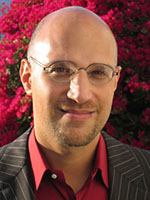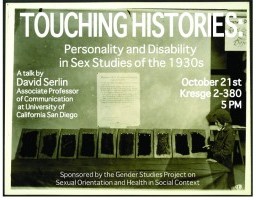Annie Wilkinson: Gender as Conspiracy: Mistrust & Misinformation in Anti-Gender Organizing in Mexico
April 14, 2023
Annie Wilkinson’s research ethnographically examines the sociopolitical and affective politics of anti-gender movements, anti-feminist organizing, and anti-LGBTQ violence in the Americas. This talk explores the role of mistrust and misinformation in anti-gender movements through a reading of anti-gender conspiracy theories in Mexico. By connecting the dots between the conditions in which they emerge and circulate –including intense political upheaval, economic uncertainty, and social insecurity– and the stories they tell of people and places both far and near, Wilkinson analyzes what contemporary anti-gender conspiracy theories tell us about the sociopolitical dynamics of anti-feminist and anti-LGBTQ politics in Mexico and beyond.
Wilkinson’s ethnographic work on transatlantic anti-gender movements, ex-gay movements and “conversion therapy” in Latin America, and transnational right-wing organizing has appeared in the International Journal of Feminist Politics, Feminist Anthropology, Social Anthropology, and North American Congress on Latin America (NACLA) and has been supported by the Wenner Gren Foundation for Anthropological Research, the National Science Foundation, the U.S. Fulbright Commission and the Institute for Citizens & Scholars (formerly Woodrow Wilson Foundation), and the US-Mexican Studies Center at the University of California San Diego. This talk draws on Wilkinson’s book manuscript, Illiberal Insecurities: Distrust and Post-Truth Populism in Anti-Gender Activism in Mexico, which examines how transnational anti-gender activism taps popular in/securities conditioned by late neoliberalism and how these movements are challenging prospects for equality and democratic conditions in Mexico and around the world.
Martha Robinson Rhodes: Bisexuality and Histories of Sexual Politics in Modern Britain
November 29, 2022
Martha Robinson Rhodes received her PhD in History from the University of Birmingham (UK) in 2021. She is a historian of modern sexuality, particularly interested in the experiences of people who slipped through the cracks of binary constructions of identity and attraction. Martha’s work uses queer oral history alongside archival sources to investigate how the historically-contingent binaries of ‘gay’ and ‘straight’, ‘normative’ and ‘deviant’ were created and reinforced by gay and lesbian politics as well as dominant straight society in the late twentieth century. She is currently working as a Policy and Research Officer at Stonewall, Europe’s largest LGBTQ+ charity. Her article ‘Bisexuality, Multiple-Gender-Attraction and Gay Liberation Politics in the 1970s’ won Twentieth Century British History‘s Duncan Tanner Prize and was selected as one of Oxford University Press’s Best of History 2020. Her work also appears in the forthcoming edited collection New Directions in Queer Oral History: Archives of Disruption, as well as Stonewall’s website and TikTok account!
Ray Noll: Queer “Situations” and Carceral Resistance
May 19, 2022
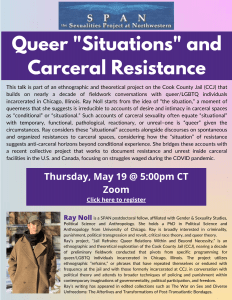
Ray Noll received her Ph.D. in Political Science and Anthropology from the University of Chicago in 2020, is jointly appointed in the Anthropology and Political Science Department. Ray is broadly interested in criminality, punishment, political transgression and revolt, critical race theory, and queer theory.
Ray’s current project, “Jail Refrains: Queer Relations Within and Beyond Necessity,” is an ethnographic and theoretical exploration of the Cook County Jail (CCJ), nearing a decade of preliminary fieldwork conducted that pivots from specific programming for queer/LGBTQ individuals incarcerated in Chicago, Illinois. The project utilizes ethnographic “refrains,” or phrases that have repeated themselves or endured with frequency at the jail and with those formerly incarcerated at CCJ, in conversation with political theory and attends to broader techniques of policing and punishment within contemporary imaginations of governmentality, political participation, and freedom. The project poses the problem of resistance and refusal to mechanisms of surveillance and captivity of CCJ by situating these ethnographic “refrains” within practices and actions (such as sexuality) that demonstrate the fundamental limits of confinement and incarceration.
Ray’s writing has appeared in edited collections such as The War on Sex and Diverse Unfreedoms: The Afterlives and Transformations of Post-Transatlantic Bondages.
SPAN Postdoc Talks & Welcome Reception
October 22, 2020
Ray Noll will receive her Ph.D. in Political Science and Anthropology from the University of Chicago in 2020. Her research and teaching interests include criminality, punishment, political transgression, race, gender, and sexuality. Ray’s dissertation is an ethnographic exploration of the Cook County Jail (CCJ), which is based on nearly a decade of preliminary fieldwork conducted with those incarcerated in Chicago, Illinois. The dissertation puts ethnographic data with those formerly incarcerated at CCJ in conversation with political theory and attends to broader shifts in techniques of policing and punishment within contemporary discourses of freedom, belonging, political participation, and resistance. Ray’s writing has appeared in edited collections such as The War on Sex and Diverse Unfreedoms: The Afterlives and Transformations of Post-Transatlantic Bondages.
Renee Shelby recently received her Ph.D. in History and Sociology from the Georgia Institute of Technology. Her research focuses on the politics of technology, inequalities around gender and sexuality, gender violence, activism and surveillance, and social theory.
Her first book project, Designing Justice: Sexual Violence, Technology, and Citizen-Activism, examines the social and legal consequences of new technologies used to prevent, investigate, and prosecute sexual assault.
Drawing on activist and inventor narratives, police administrative data, and media coverage, Renee charts a shift in the dominant response to sexual violence: from a legal to a techno-legal response. Her findings contribute new perspectives on the role of seemingly progressive technologies in policing survivors, upholding carceral logics, and coproducing gendered and racialized knowledge about sexuality and sexual violence. By bringing the Science and Technology Studies framework of coproduction, her project advances analyses of the anti-sexual violence movement by shifting the focus off protest-based, or disruptive collective action, to the epistemic dimensions and organizational forms of counterpublic knowledge. Renee reveals how technology remains a battleground for activists and the state officials to narrate and materialize competing conceptions of sexual consent, vulnerability, and justice, but also one that produces contentious knowledge among activists. Renee has ongoing interests in the politics of technology, knowledge production, law and inequality, whiteness, and critical race theory.
Renee’s work has been funded by the ACLS/Carnegie Mellon Foundation. Her research has appeared in Feminist Media Studies, Theoretical Criminology, Engaging Science and Technology Studies, and Criminal Justice Studies, among others.
SPAN Postdoc Talks & Welcome Reception
November 27, 2018
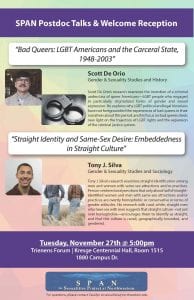
Scott De Orio received his Ph.D. in History and Women’s Studies from the University of Michigan in 2017. His research focuses on the intersection of LGBTQ history and the history of the carceral state. His first book project, “Punishing Queer Sexuality in the Age of LGBT Rights,” examines the changing ways in which the branch of the carceral state concerned with controlling sex crimes has targeted LGBTQ subjects in the U.S. since World War II. His second project is a transatlantic study of the regulation of child sexuality from the Enlightenment to the present. Scott’s writing has appeared in the Journal of the History of Sexuality, in the edited collection The War on Sex, and on the blog NOTCHES: (re)marks on the history of sexuality.
Tony Silva’s research interests include gender, sexuality, rural sociology, qualitative and quantitative methods, and race/ethnicity. His research examines how individuals negotiate and understand social categories that—while often perceived as natural—are actually affected by social context. Specifically, he examines gender and sexual identities, including their intersections with race, place, class, and age, and investigates diversity within them. As a mixed-methods researcher, he conducts research using interviews and secondary data analysis of nationally representative surveys. Currently, he is preparing a book manuscript from his interviews with 60 rural, white, straight-identified men who have sex with men. His published papers appear in Social Forces, Sociological Perspectives, Sexuality Research and Social Policy, Gender & Society, and Sexualities.
Mitali Thakor: “Do digital police dream of electric creeps?”
February 1, 2018
How are bogeymen imagined? What are the lures created to lead them into police captivity? In this talk I discuss the policing networks emerging to respond to digitally mediated sexual exploitation of children. Based on ongoing ethnographic fieldwork with law enforcement, tech companies, NGOs, and computer scientists, I present current work on the use of non-human childlike avatars and robot dolls in police efforts. I situate these case studies within longer histories of entrapment, drawing on queer studies, critical race studies, and the anthropology of design and technology. AI-enabled avatars and robots that strive for hyperrealism achieve success through their ability to deceive. The craftiness of artificial lures indicates how traps may be encoded into internet architecture, and how such lures portend new forms of extrajudicial, networked policing.
Mitali Thakor is a SPAN postdoctoral fellow in Anthropology and Gender & Sexuality Studies. Her research and teaching cover issues of policing, computing, surveillance, sexual violence, and queer studies of robotics. She is currently working on her book manuscript, Facing the Child, an ethnography of artifice, veracity, and the global policing of child exploitation online. Mitali earned her PhD in 2016 from MIT’s program in History, Anthropology, and Science, Technology, & Society. In Fall 2018, Mitali will join Wesleyan University as an assistant professor in the Science in Society Program. You can read more about her work at www.mitalithakor.com and follow her @mitalithakor.
Abram J. Lewis: “The Lunar Effect: Self-Loss and Cosmic Consciousness in the Mad-Queer 1970s”
March 6, 2018
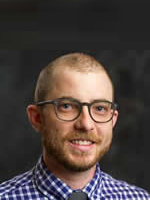
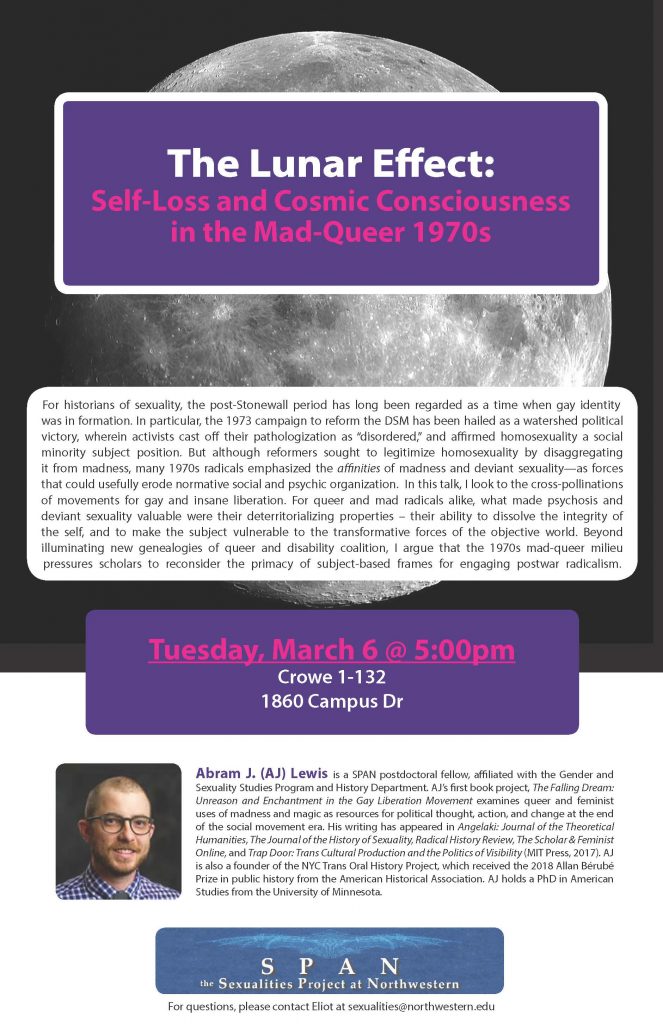
For historians of sexuality, the post-Stonewall period has long been regarded as a time when gay identity was in formation. In particular, the 1973 campaign to reform the DSM has been hailed as a watershed political victory, wherein activists cast off their pathologization as “disordered,” and affirmed homosexuality a social minority subject position. But although reformers sought to legitimize homosexuality by disaggregating it from madness, many 1970s radicals emphasized the affinities of madness and deviant sexuality—as forces that could usefully erode normative social and psychic organization. In this talk, I look to the cross-pollinations of movements for gay and insane liberation. For queer and mad radicals alike, what made psychosis and deviant sexuality valuable were their deterritorializing properties – their ability to dissolve the integrity of the self, and to make the subject vulnerable to the transformative forces of the objective world. Beyond illuminating new genealogies of queer and disability coalition, I argue that the 1970s mad-queer milieu pressures scholars to reconsider the primacy of subject-based frames for engaging postwar radicalism.
Abram J. (AJ) Lewis is a SPAN postdoctoral fellow, affiliated with the Gender and Sexuality Studies Program and History Department. AJ’s first book project, The Falling Dream: Unreason and Enchantment in the Gay Liberation Movement examines queer and feminist uses of madness and magic as resources for political thought, action, and change at the end of the social movement era. His writing has appeared in Angelaki: Journal of the Theoretical Humanities, The Journal of the History of Sexuality, Radical History Review, The Scholar & Feminist Online, and Trap Door: Trans Cultural Production and the Politics of Visibility (MIT Press, 2017). AJ is also a founder of the NYC Trans Oral History Project, which received the 2018 Allan Bérubé Prize in public history from the American Historical Association. AJ holds a PhD in American Studies from the University of Minnesota.
SPAN Postdoc Talks & Welcome Reception
October 13, 2016
Mitali Thakor: “Lures: Digital Pornotroping, Carceral Design, and the Global Policing of Child Sexual Exploitation”
Mitali Thakor completed her PhD in 2016 from MIT’s Program in History, Anthropology, and Science, Technology & Society (HASTS). Her dissertation research covers the design and use of new digital techniques to locate child pornography online, from 3D avatars to image recognition software. Mitali’s ethnographic fieldwork in the Netherlands, Thailand, and the U.S. explores partnerships and tensions between international police, border control, computer scientists, UN bureaucrats, and activists as they develop algorithmic solutions to cases of exploitation and trafficking.
Mitali is broadly interested in feminist STS, queer studies of punishment, digital anthropology, critical race studies on borders and migration, and public discourses around technology, software design, sex work, sexual exploitation, and civic empowerment. She holds a B.A. in Feminist Studies and Anthropology from Stanford and has previously worked in Thailand and the Philippines. Mitali works for East Coast Solidarity Summer, an educational program for radical South Asian American youth, and also organizes on issues of sexual violence and prison abolition.
Abram J. Lewis: “Disappearing the Police Station: Enchantment and Occult Politics in the Gay Liberation Movement”
Abram J. (AJ) Lewis completed his PhD in American Studies at the University of Minnesota and was a Visiting Assistant Professor in Gender, Women’s and Sexuality Studies at Grinnell College. AJ’s research and teaching interests include queer and feminist theory, LGBT history, trans studies, postsecular studies, women of color feminisms, and the new ontologies. His project, “The Falling Dream: Unreason and Enchantment in the Gay Liberation Movement,” examines queer activist challenges to secularism and reason at the end of the social movement era. He is interested in how experiments with madness, spells, psychic powers, psychedelics, and otherworldly forces helped expand possibilities for thinking and acting during the early onset of neoliberalism. AJ’s writing has appeared in Radical History Review, The Journal of the History of Sexuality, and The Scholar & Feminist Online. AJ is also the recipient of the 2016 Gregory Sprague Prize from the American Historical Association’s Committee on LGBT History.
Aaron Norton: “The Foreskinification of AIDS: The Emergence of Circumcision Status as an HIV-Risk Category in the Era of Molecular Risk Politics”
April 7, 2016
Aaron Norton received his PhD in Psychology in 2014 from the University of California, Davis. His dissertation drew upon interdisciplinary perspectives on risk to examine the science, ethics, and politics of male circumcision’s emergence as an HIV-risk category and prevention strategy. He is a postdoctoral fellow with the Sexualities Project at Northwestern.
In 2007, the WHO endorsed male circumcision as an important strategy in combatting the AIDS epidemic in sub-Saharan Africa after three randomized controlled trials demonstrated MC’s ability to reduce risk of female-to-male HIV transmission. In this talk, I discuss the role played by claims regarding the foreskin’s inherent penetrability in promoting circumcision as an HIV-risk reduction strategy that should inform U.S. circumcision policy. In a partial shift from past HIV-classification regimes focused on sexual identity or behavior, I suggest that rhetorically locating risk in the foreskin constructs the uncircumcised body’s sexual future as inherently risky, often irrespective of other important considerations.
Kai M. Green: “Saying ‘Yes’ to the Bulldagger Within: A Black Lesbian Trans* Inheritance”
March 1, 2016
Kai M. Green received his Ph.D. from the Department of American Studies and Ethnicity at the University of Southern California in 2014. He is a writer, scholar, poet, filmmaker, abolitionist, feminist and whatever else it takes to make a new and more just world. He is a postdoctoral fellow with the Sexualities Project at Northwestern (SPAN) for 2014-16.
In this talk, SPAN Postdoc Kai M. Green uses local print materials from Los Angeles in the 90s to examine the relationship between Black Lesbian feminism and Black trans embodiment. He examines the way local Black lesbians create black queer genealogies that experiment with myth and “proper” history in order to create a knowable past for themselves.
Mark McCormack: “Those Cuddling Brits: Spooning, Intimacy and the Transformation of Masculinity”
November 13, 2014
Research has traditionally shown that heterosexual men are emotionally and physically distant from their male friends. Drawing on interview and ethnographic data over the past 5 years, Dr Mark McCormack shows how decreasing homophobia has resulted in a transformation of male friendships, with emotional intimacy and physical tactility important parts of young men’s lives. Hugging, cuddling and even spooning in bed, British male youth publically proclaim love for their friends without questioning their gendered or sexual identities.
Dr Mark McCormack is Senior Lecturer in Sociology and Co-Director of the Centre for Sex, Gender and Sexualities at Durham University, England. His research examines the effects of decreasing homophobia on the gendered and sexual lives of US and UK youth. He has published over 20 articles in international journals, and his book The Declining Significance of Homophobia: How Teenage Boys are Redefining Masculinity and Heterosexuality is published with Oxford University Press.
Aaron Norton: “‘You mean you’re not circumcised!’ Male circumcision campaigns for HIV-prevention and the making of bio-sexual subjects”
October 30, 2014
In 2007, the World Health Organization endorsed male circumcision’s use as an HIV-prevention strategy in high HIV-prevalence areas. This talk considers how efforts to promote circumcision among heterosexual men in sub-Saharan Africa articulate new forms of sexual responsibility, communal belonging, and blame.
Aaron Norton received his PhD in psychology in 2014 from the University of California, Davis. His dissertation drew upon interdisciplinary perspectives on risk to examine the science, ethics, and politics of male circumcision’s emergence as an HIV risk category and prevention strategy. He is a postdoctoral fellow with the Sexualities Project at Northwestern.
Kai M. Green: “Into the Darkness: A Quare (Re)Membering of Los Angeles in a Time of Crises” October 16, 2014
Kai M. Green received his Ph.D. from the Department of American Studies and Ethnicity at the University of Southern California in 2014. He is a writer, scholar, poet, filmmaker, abolitionist, feminist and whatever else it takes to make a new and more just world. He is a postdoctoral fellow with the Sexualities Project at Northwestern (SPAN) for 2014-16.
Into the Darkness examines the ways in which Black queer folk articulate, create, and (re)construct, Quare space and place in Los Angeles from 1981 to the present. I use the term Quare, a term coined by E. Patrick Johnson, as it is an act of (re)membering a simultaneous articulation of blackness and queerness. Quare signals a range of possible subjectivities that include and exceed the limits of LGBT. In 1981, the crises that Black people experienced in Los Angeles because of rising incarceration rates, unemployment, drug addiction and gang violence, were further compounded by the arrival of HIV/AIDS. While there was much silence and stagnation nationally and locally in Black and white communities in response to HIV/AIDS, there were Black queer folk in South Los Angeles who provided knowledge, support, community, and life saving opportunities for themselves and their communities. This dissertation reveals some of those Quare struggles in South Los Angeles. Darkness is an instructive framework, a scale that helps us to understand the relationship between place making and the production of identity and difference. Darkness functions in three ways: 1) A physical embodiment (Blackness) 2) A type of place (South Los Angeles) 3) The intellectual and imaginary site of (re)production of Black queer knowledge. In order to complete this project, I utilize an interdisciplinary methodology that combines historiography, ethnography, and ethnographic film. I have located much of my archive from local community collectors who have amassed much of Black queer Los Angeles’ histories without formal institutional support. This manuscript highlights my investment in community-engaged scholarship and alternative sources of knowledge production. By documenting events, stories and interviews digitally, I, too, have participated in creating and extending Black queer and Quare Los Angeles’ archive.
Dean Spade: “Normative Life”
May 2, 2013
Dean Spade is an Associate Professor at Seattle University School of Law. He teaches Administrative Law, Poverty Law, and Law and Social Movements. Prior to joining the faculty of Seattle University, Dean was a Williams Institute Law Teaching Fellow at UCLA Law School and Harvard Law School, teaching classes related to sexual orientation, gender identity, law, and social movements.
Priscilla Wald: “What is Human Now?: The Science Fiction of Henrietta Lacks and Other Tales from the Lab”
March 7, 2013
Priscilla Wald is Professor of English and Women’s Studies at Duke University. She teaches and works on U.S. literature and culture, particularly literature of the late-18th to mid-20th centuries, contemporary narratives of science and medicine, science fiction literature and film, and environmental studies. Her recent book-length study, Contagious: Cultures, Carriers, and the Outbreak Narrative, considers the intersection of medicine and myth in the idea of contagion and the evolution of the contemporary stories we tell about the global health problem of “emerging infections.”
Wald’s talk was part of a larger book project entitled Human Being After Genocide. Proceeding from the now-famous case of Henrietta Lacks (the subject of the 2011-12 “One Book One Northwestern” selection), Wald pointed out the ways in which the new biotechnologies emerging after the Second World War challenged understandings of what it meant to be human, as did social thought in the wake of the Holocaust and as part of processes of decolonization. Wald argued that the definition of what it means to be human—that is, whether it should be understood in terms of the individual, as a species, or through distinctive social populations—was very much “up for grabs” during the post-war period. During this same period, for example, science fiction blossomed as a genre to provide new creation narratives for humanity. Ultimately, Wald’s talk illuminated the numerous ways in which contesting definitions of the human have had, and continue to have, profound implications not only for bioethics, but also for social and economic justice. (Adapted from Kirsten Leng, “Duke Professor Asks ‘What is human now?,’” Gender Dynamic: The Gender & Sexuality Studies Newsletter (2013), p.9.) Co-sponsored by the Edith Kreeger Wolf Endowment.
Vagner de Almeida: “LGBT Brazil in Film”
March 28, 2012
Vagner de Almeida is affiliated with the Center for Gender, Sexuality, and Health of the Mailman School of Public Health at Columbia University. He also coordinates the Brazilian Interdisciplinary AIDS Association (ABIA) in Rio de Janeiro. Mr. de Almeida has written and produced several plays about HIV/AIDS, and has emerged as one of the leading documentary filmmakers in Brazil working on issues related to gender, sexuality, sexual rights and HIV/AIDS. His work has received wide recognition in Brazil and abroad. His honors include the MTT Gay, Transvestite and Transgender Award (Turma OK, Rio de Janeiro, 2004), the Best Documentary Award for “Borboletas da Vida” (New York Brazilian Film Festival, USA, 2006), and several prizes from the GLBT Pride Parade in São Paulo. He was nominated for the 2008 Human Rights Award by the Brazilian Government.
Screenings of “The Butterflies”(Borboletas da Vida) and “I’m a Woman, I’m a Brazilian, I’m a Lesbian” (Sou Mulher, Sou Brasileira, Sou Lésbica), in Portuguese with English subtitles. Followed by a conversation with Mr. de Almeida, facilitated by Prof. Nick Davis (English and Gender & Sexuality Studies) and Gregory Mitchell (PhD, Performance Studies). Co-sponsored by African American Studies, Gender & Sexuality Studies, Latina and Latino Studies, the LGBT Resource Center, Performance Studies, Project ShoutOUT, Radio-TV-Film, the Queer Pride Graduate Student Association, the Rainbow Alliance, Screen Cultures, and Spanish and Portuguese.
Kirsten Leng: “Science, the ‘Invincible and Strongest Ally’ of Women’s Rights?: Feminism, Sexology and Sexual Politics in Germany and Britain at the Turn of the Twentieth Century”
February 2, 2012
Kirsten Leng was a 2011-13 Postdoctoral Fellow in Sexuality Studies, recruited through the Sexualities Project at Northwestern. She was affiliated with History and Gender Studies and taught for both units. Dr. Leng completed her doctorate in History and Women’s Studies at the University of Michigan. Her dissertation examines the role sexual science played in German and British feminists’ sexual politics from 1880-1914. Her work documents how feminists’ engagement with sexual science enabled them to both advance demands for sexual reform and contribute to the creation of sexual knowledge. However, her work also illuminates how sexual science limited the aims and reach of feminist sexual politics. While at Northwestern, she began a new project that examined the transformation of German and British feminist sexual politics and sexual science from 1914 to 1939 in the face of generational shifts, legal changes to women’s status, technological and scientific innovations, and exceptional political events such as war, revolution, democratization, fascism, and mass emigration.
Evren Savci: “Muslim to One’s Self or Muslim to Everyone: Universal Human Rights Discourse and the Production of an Islamic Backlash Against Homosexuality in Turkey”
October 27, 2011
Evren Savci was a 2011-13 Postdoctoral Fellow in Sexuality Studies, recruited through the Sexualities Project at Northwestern. She was affiliated with Sociology and Gender Studies and taught for both units. Dr. Savci completed her Ph.D. at USC in Sociology and Gender Studies in 2011. Her dissertation project was a multi-sited, multi-method analysis of contemporary urban queer sites and politics in Turkey, and what they reveal about the mechanisms of abjection of the modern westernizing Nation-State, especially the roles played by processes of sexualization, racialization, secularization, criminalization and gendering of citizen subjects within the context of modern nation-state formation and national aspirations for “civilization.” Currently, Dr. Savci is studying practices of Islamic matrimony, cousin marriage, and polygamy that were outlawed or strongly discouraged by the new Republic, yet are still practiced today. Through looking at the contemporary forms of these practices, she will think about what stake the Turkish nation-state had in regulating these forms of sexuality and what these “failures” and their persistence tell us about Westernization in return.
David Serlin: “Touching Histories: Personality and Disability in Sex Studies of the 1930s”
October 21, 2010
David Serlin is associate professor and vice chair of the Department of Communication at UC San Diego, where he is also affiliated faculty in Critical Gender Studies and Science Studies. His research interests include nineteenth- and twentieth-century cultural studies of medicine and health; gender/sexuality studies and queer theory; disability studies; material culture and museum studies; architecture, urbanism, and the built environment; and histories of the senses. He is the author of Replaceable You: Engineering the Body in Postwar America (University of Chicago Press, 2004), which was the recipient of the 2005 Alan Bray Memorial Book Award from the Modern Language Association; the coeditor of two anthologies, Policing Public Sex: Queer Politics and the Future of AIDS Activism (South End Press, 1996) and Artificial Parts, Practical Lives: Modern Histories of Prosthetics (NYU Press, 2002); and the editor of Imagining Illness: Public Health and Visual Culture (University of Minnesota Press, 2010). He is currently completing a book manuscript entitled “Window Shopping with Helen Keller: Architecture and Disability in Modern Culture,” to be published by the University of Chicago Press in 2012.
“Touching Histories” investigates a set of psychological and anatomical studies conducted by Carney Landis, a colleague of Alfred Kinsey’s, on a group of young disabled women living in the New York City metropolitan region during the late 1930s. This presentation uncovers the role that the affective category of touch – touching others, touching one’s self, and both fearing and desiring to be touched – played in the lives of Landis’s research population. By making a deliberate shift away from Freudian models of psychosexual development, one discovers that the medium of touch produced meanings for Landis’s research subjects even as those meanings eluded Landis himself, illuminating forms of sexual subjectivity that we do not regularly associate with either histories of disability or histories of sexuality.

